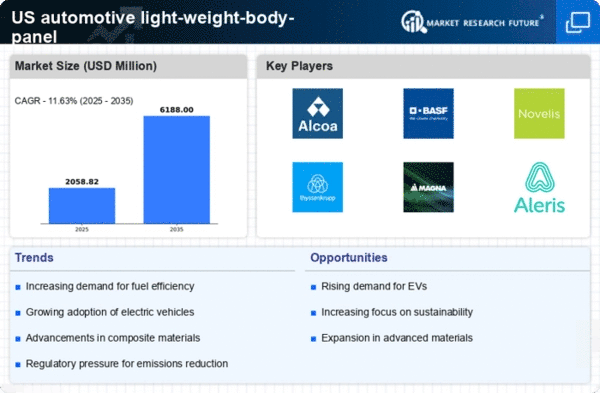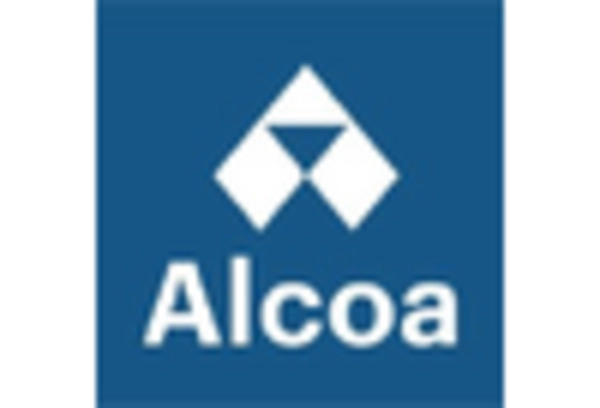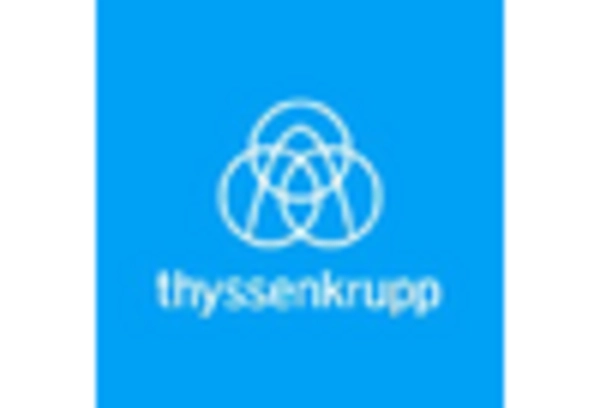Consumer Demand for Fuel Efficiency
Consumer preferences in the US are increasingly shifting towards fuel-efficient vehicles, which is a crucial driver for the automotive light-weight-body-panel market. As fuel prices fluctuate, consumers are more inclined to purchase vehicles that offer better mileage, prompting manufacturers to focus on reducing vehicle weight. Lightweight body panels play a pivotal role in enhancing fuel efficiency, as every 10% reduction in vehicle weight can lead to a 6-8% improvement in fuel economy. This growing consumer demand for fuel-efficient vehicles is likely to propel the automotive light-weight-body-panel market, with projections indicating a market growth of around 4% annually. Consequently, automakers are investing in research and development to create innovative lightweight solutions that cater to this consumer trend.
Regulatory Compliance and Standards
The automotive light-weight-body-panel market is significantly influenced by stringent regulatory compliance and standards aimed at enhancing vehicle safety and environmental sustainability. In the US, regulations such as the Corporate Average Fuel Economy (CAFE) standards mandate automakers to improve fuel efficiency, which often necessitates the use of lighter materials. This regulatory landscape drives manufacturers to adopt advanced lightweight materials, such as aluminum and composites, to meet these requirements. As a result, The automotive light-weight-body-panel market is expected to witness a steady growth rate of approximately 5% annually, as companies strive to comply with these evolving standards. Furthermore, adherence to safety regulations, including crash test performance, compels manufacturers to innovate in lightweight design, thereby propelling the market forward.
Competitive Pressure and Market Dynamics
Competitive pressure within the automotive industry is a significant driver of the automotive light-weight-body-panel market. As automakers strive to differentiate their products, the demand for innovative lightweight solutions intensifies. This competitive landscape encourages companies to invest in research and development to create advanced materials and designs that enhance vehicle performance and aesthetics. The automotive light-weight-body-panel market is likely to experience a growth rate of around 4%, as manufacturers seek to gain a competitive edge. Furthermore, collaborations between automotive companies and material suppliers are becoming more common, fostering innovation and accelerating the development of lightweight technologies. This dynamic interplay between competition and collaboration is shaping the future of the market.
Sustainability and Environmental Concerns
Sustainability and environmental concerns are increasingly influencing the automotive light-weight-body-panel market. As awareness of climate change and environmental degradation grows, consumers and manufacturers alike are prioritizing eco-friendly practices. Lightweight materials, such as recycled aluminum and bio-composites, are gaining traction as they contribute to lower emissions and reduced energy consumption during production. The automotive industry is responding to this shift by investing in sustainable materials and processes, which is projected to drive the automotive light-weight-body-panel market by approximately 5% annually. Additionally, manufacturers are exploring end-of-life recyclability of lightweight panels, further enhancing their appeal in an environmentally conscious market.
Technological Advancements in Manufacturing
Technological advancements in manufacturing processes are reshaping the automotive light-weight-body-panel market. Innovations such as advanced welding techniques, 3D printing, and automated assembly lines are enabling manufacturers to produce lightweight components with greater precision and efficiency. For instance, the adoption of robotic welding has improved the structural integrity of lightweight panels while reducing production time and costs. As these technologies become more accessible, the automotive light-weight-body-panel market is expected to expand, with an estimated growth rate of 6% over the next few years. Furthermore, the integration of smart manufacturing technologies, including IoT and AI, is likely to enhance production capabilities, allowing for more complex designs and materials to be utilized in lightweight body panels.

















